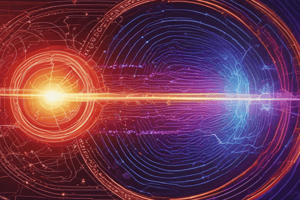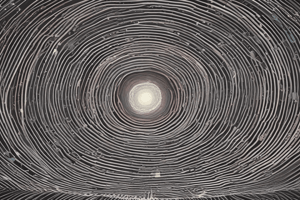Podcast
Questions and Answers
What are the three materials that can be made into temporary magnets?
What are the three materials that can be made into temporary magnets?
- Copper, Silver, Cobalt
- Iron, Nickel, Copper
- Iron, Nickel, Cobalt (correct)
- Gold, Aluminum
Which of these options are correct? (Select all that apply)
Which of these options are correct? (Select all that apply)
- The strength of a magnetic field decreases as distance from the magnetic decreases
- Opposite poles of magnets attract (correct)
- Same poles of magnets repel (correct)
- The strength of a magnetic field increases as distance from the magnetic decreases (correct)
Magnetic field lines point from the South to the North pole of a magnet.
Magnetic field lines point from the South to the North pole of a magnet.
False (B)
The Earth's magnetic core is above Canada and is a South Pole.
The Earth's magnetic core is above Canada and is a South Pole.
The direction of current in a wire is dictated by the right hand grip rule.
The direction of current in a wire is dictated by the right hand grip rule.
A solenoid has the same shape magnetic field as a bar magnet.
A solenoid has the same shape magnetic field as a bar magnet.
What is the term for the movement of a wire in a magnetic field?
What is the term for the movement of a wire in a magnetic field?
What is the name of the rule used to determine the force on a wire in a magnetic field?
What is the name of the rule used to determine the force on a wire in a magnetic field?
A DC current creates a constant magnetic field.
A DC current creates a constant magnetic field.
An alternator produces a DC current.
An alternator produces a DC current.
The electric current in a dynamic microphone is proportional to the sound signal.
The electric current in a dynamic microphone is proportional to the sound signal.
A _________ is a device that transforms the energy carried by an alternating current into a magnetic field and back again.
A _________ is a device that transforms the energy carried by an alternating current into a magnetic field and back again.
A step-up transformer increases the voltage of the secondary coil, but decreases the current.
A step-up transformer increases the voltage of the secondary coil, but decreases the current.
What type of current is produced by a dynamo?
What type of current is produced by a dynamo?
What part of the dynamic microphone is free to move?
What part of the dynamic microphone is free to move?
Flashcards
What are magnetic poles?
What are magnetic poles?
Two ends of a magnet, where the magnetic force is strongest. One end is labeled North (N) and the other South (S).
How do magnetic poles interact?
How do magnetic poles interact?
Magnets with the same poles repel each other. Magnets with opposite poles attract each other.
What is a permanent magnet?
What is a permanent magnet?
A magnet that is always magnetic, always has poles, and does not require an outside force to be magnetic.
What is an induced magnet?
What is an induced magnet?
Signup and view all the flashcards
What is a magnetic field?
What is a magnetic field?
Signup and view all the flashcards
How do we measure magnetic fields?
How do we measure magnetic fields?
Signup and view all the flashcards
What is the Earth's magnetic field?
What is the Earth's magnetic field?
Signup and view all the flashcards
Where is the Earth’s South Magnetic Pole?
Where is the Earth’s South Magnetic Pole?
Signup and view all the flashcards
What is current?
What is current?
Signup and view all the flashcards
What is the Right Hand Grip Rule?
What is the Right Hand Grip Rule?
Signup and view all the flashcards
How does the current affect the strength of a magnetic field?
How does the current affect the strength of a magnetic field?
Signup and view all the flashcards
How does distance from a wire affect the magnetic field?
How does distance from a wire affect the magnetic field?
Signup and view all the flashcards
What is a solenoid?
What is a solenoid?
Signup and view all the flashcards
How does an iron core affect a solenoid’s magnetic field?
How does an iron core affect a solenoid’s magnetic field?
Signup and view all the flashcards
What is the motor effect?
What is the motor effect?
Signup and view all the flashcards
What is Fleming’s Left-Hand Rule?
What is Fleming’s Left-Hand Rule?
Signup and view all the flashcards
What is magnetic flux density?
What is magnetic flux density?
Signup and view all the flashcards
What is an electric motor?
What is an electric motor?
Signup and view all the flashcards
What is an electric generator?
What is an electric generator?
Signup and view all the flashcards
What is electromagnetic induction?
What is electromagnetic induction?
Signup and view all the flashcards
What is a transformer?
What is a transformer?
Signup and view all the flashcards
What is a step-up transformer?
What is a step-up transformer?
Signup and view all the flashcards
What is a step-down transformer?
What is a step-down transformer?
Signup and view all the flashcards
What is the transformer equation?
What is the transformer equation?
Signup and view all the flashcards
How does a dynamic microphone work?
How does a dynamic microphone work?
Signup and view all the flashcards
How does a loudspeaker work?
How does a loudspeaker work?
Signup and view all the flashcards
What is the difference between AC and DC?
What is the difference between AC and DC?
Signup and view all the flashcards
What is a dynamo?
What is a dynamo?
Signup and view all the flashcards
What is an alternator?
What is an alternator?
Signup and view all the flashcards
Study Notes
Magnetism and Electromagnetism
-
Magnets:
- North and South poles; like poles repel, unlike poles attract.
- Permanent magnets always have poles.
- Induced magnets can be temporarily magnetized by stroking with a permanent magnet. This aligns magnetic domains.
- Iron, nickel, and cobalt are magnetic materials.
-
Magnetic Fields:
- Field lines point from North to South.
- Strength decreases with distance from the magnet.
- Plotting compasses show the direction of the magnetic field.
- Earth's core creates a magnetic field; compass aligns with Earth's field lines, not Geographic North.
-
Current and Magnetic Fields:
- Current produces a magnetic field around a wire (circular in shape).
- Right-hand grip rule determines field direction.
- Greater current, stronger field.
- Greater distance from wire, weaker field.
Solenoid
- The magnetic field shape is similar to a bar magnet.
- Coiling the wire enhances the effect.
- Using an iron core strengthens the magnetic field.
- Factors affecting solenoid strength include current, length, cross-sectional area, number of turns and using a soft iron core.
The Motor Effect
- Two magnets or a magnet and a current-carrying wire interact.
- Forces exist due to magnetic fields interacting.
- The force is at right angles to both the current and the magnetic field.
- Fleming's left-hand rule helps determine the direction of the force.
How Electric Motors Work
- A coil of wire rotates between permanent magnets (due to force changes)
- This is due to current flowing through a wire in a magnetic field.
- The wire experience a torque.
- This creates an alternating current (AC).
Electromagnetic Induction
- Relative movement between a conductor and magnetic field induces a potential difference.
- Changing magnetic field also induces potential difference. This creates a current if the conductor forms a complete circuit.
- The current created opposes the inducing change.
How Electric Generators (Dynamos) Work
- Similar setup to a motor; coil of wire rotates between magnets.
- Rotating the coil cuts through magnetic field, inducing a potential difference.
- A complete circuit produces current.
- Direct Current (DC) created using a split ring commutator; this ensures current is always flowing in the same direction.
Transformers
- AC in the primary coil creates a changing magnetic field.
- This induces a current in the secondary coil.
- More coils on the secondary coil means an increased voltage (step-up transformer).
- Fewer coils on the secondary coil means a decreased voltage (step-down transformer).
How Microphones Work
- Dynamic microphones use a coil of wire in a magnetic field to produce a current proportional to the sound signal.
- Sound pressure waves move the coil, creating the current.
Loudspeakers
- These work in reverse of a microphone.
- The current in the coil interacts with the magnetic field to move the cone of the loudspeaker.
- This produces sound pressure waves.
Studying That Suits You
Use AI to generate personalized quizzes and flashcards to suit your learning preferences.




